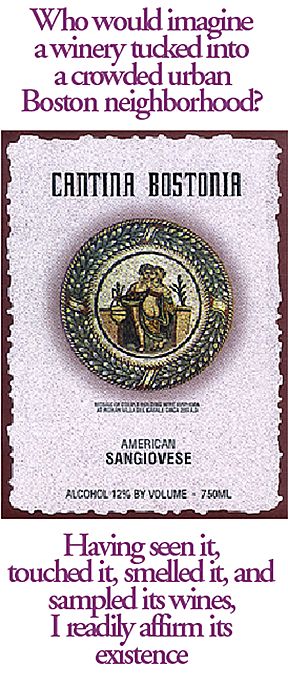Cantina Bostonia
Cantina
Bostonia occupies a
corner of the old Haffenreffer brewery complex in the
Jamaica Plain section of the city, a massive Victorian brick
edifice build 135 years ago. (The Boston Beer Company,
brewer of Samuel Adams beers and ales, is also located
within.)
The owner and
winemaker (“maestro del vino”) of Cantina Bostonia is a
51-year-old Rodolfo Canale, a youthful and committed native
of Forli, in the Romagna region of Italy (where his father
made wine for home consumption: don’t all Italians?). Canale
has always been interested in health-enhancing diets. He
even owned a macrobiotic restaurant before he emigrated in
198O. His business here (Twenty First Century Foods) was
initially focused only on food, particularly tempeh (an
Indonesian form of bean curd) and tofu. He felt, however,
that his own health was incompletely served without wine,
but he didn’t want to drink wine with additives, so he began
making his own. Eventually there was more wine than could be
consumed at home: Cantina Bostonia was commercially licensed
in 2OO1. Rodolfo’s wife, Lovin, daughter, Luana, and son,
Robin, help at the winery. The food production continues,
chiefly tofu-based products.
Grapes all come
from various Californian locations, including Napa and more
southerly sites. The Sangiovese and Zinfandel I tasted
originated in the Lodi area. Canale has been seeking closer
grapes sources, so far without satisfaction. He much prefers
and has made only red wines, especially ripe and boldly
fruity ones, but is now trying to develop at least one white
wine. He is determined to make his wines as naturally as
possible. Quality image is most important to him: he’d
rather not offer for sale a wine that doesn’t meet his
personal standards.
Canale has his
own ways of doing things. (Based on my tastings, I must
conclude they work.) He soaks the chosen grapes in water
with some baking soda (to eliminate inapparent mold and
pesticide residue), rinses them, then dries them on racks
with a fan overnight or for up to three days to get rid of
the water and to concentrate the grapes. This recalls, in
abbreviated form, the appassimento stage of Amarone
production, but without the Botrytis. Natural yeasts – those
found on the grape skins – are allowed to work their will.
Oxidative damage and microbiological spoilage are controlled
by the laying on of carbon dioxide. A thin film of paraffin
on the surface of the wine in barrel is also protective.
Canale adds no cultivated yeast, sugar, acid, sulfite or
other chemicals. He does use oak chips, which he prepares
himself from selected used barrels.
About 1OOO
gallons per year (about 4OO cases) are produced. This will
likely increase. Retail costs range from $1O to $12 per
bottle. They are sold in Massachusetts at Blanchard Liquors
in Jamaica Plain, Harvest Cooperative Market in Jamaica
Plain and Cambridge, Whole Foods Market in Cambridge, Wine
Gallery in Brookline, Marty’s Liquors in Newtonville, and
Warehouse Wine and Spirits in Framingham, and are on the
wine lists of Pomodoro restaurant and Matt Murphy’s Pub,
both in Brookline Village.
Let’s taste the
wines Red Table Wine 2OO5 A blend that may include
carignane, alicante, muscat, barbera, syrah, and zinfandel.
Dark and saturated. Somewhat vegetal nose. Of unusually high
acidity. Decent finish. Sangiovese 2OO5 The predominant
grape of Canale’s native region in Italy. This is a barrel
sample. Good color, fruit and balance, with a touch of oak.
Seems shy yet. Sangiovese 2OO4 Already bottled. Riper, with
more intense fruit. Quite good. Zinfandel 2OO5 Good color.
Enough fruit to make a well-balanced wine with good
structure, but the vegetal character is, to my taste, a
liability. A Merlot was not ready for tasting. The
Sangioveses are the best bets.
Cantina Bostonia
3OA Germania Street, Jamaica Plain (Boston), MA O213O.
617.522.7595 rodolfoc@bellatlantic.net. Visits by
appointment.

